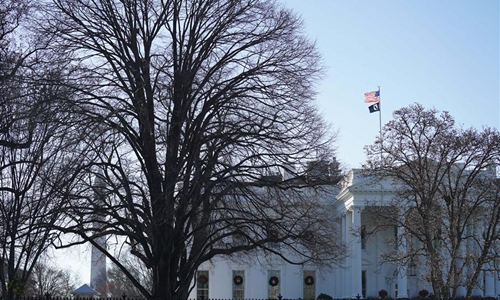Time for some UN agencies to move out of US

The White House is seen in Washington D.C., the United States, on Dec. 18, 2019. U.S. Democrat-led House of Representatives is engaging in a heated, polarized floor debate that will last for several hours on articles of impeachment ahead of historic impeachment votes over President Donald Trump on Wednesday.
2020 marks the 75th anniversary of the foundation of the United Nations (UN) and is bound to be an extraordinary year for the UN. The US reportedly denied Iran’s Foreign Minister Mohammad Javad Zarif a visa to attend the UN Security Council meeting on the theme of upholding the UN Charter held in New York on January 9, which has drawn flak from international media.
First of all, visa denial has become a special weapon for the US.
During the past year, the US has repeatedly made use of its special status as home to the UN headquarters to delay issuing visas or deny visas in order to selectively hinder officials of some countries from attending meetings and events held by international organizations. Leaders and diplomats of Russia, Cuba and Iran have been treated this way frequently.
It is untenable for the US to deny visas for the sake of security and terrorism. Who believes that the presence of a foreign minister from a sovereign state and a member state of the UN at some meeting at the UN would threaten the security of America, or be suspected of terrorism? Denying visas on account of time is also an excuse since Iran’s foreign minister applied for the visa several weeks earlier. The only explanation is that the US was worried Iran’s minister would during the Security Council meeting condemn the killing it carried out in Baghdad.
The UN is a place where its member states can reason with each other, and the Security Council is an agency which shoulders primary responsibility for maintaining international peace and security. The US takes advantage of its location as the host country and utilizes visa denial as a weapon against countries unfriendly to it so as to deprive their foreign ministers of the opportunity to reason at the UN Security Council.
Second, it is an obligation instead of a right for the US to provide visas for representatives of UN member states.
According to the relevant regulations of the UN Headquarters Agreement, reached between the US and the UN in 1947, the former is obliged to allow foreign diplomats to enter for the purpose of attending UN conferences; relevant UN personnel have the right to freely enter and exit the headquarters without obstruction from American domestic laws; the permanent representatives of UN member states can enjoy certain privileges and exemptions.
Even during the Cold War, the US rarely used visa denial to threaten its so-called enemy states and countries with which it had not established diplomatic relations. In November 1950, the Chinese government sent a delegation with Wu Xiuquan as its special representative and Qiao Guanhua its adviser to attend a Security Council meeting discussing issues about North Korea. At that time, China and the US were still hostile toward each other, but the latter did not block the Chinese delegation from entering America through visa denial or other methods.
Unilateralism is widely adopted by the current US government. Withdrawal from international organizations, walking away from deals, default and visa denial are US President Donald Trump’s blows against multilateralism. If it is a right for the US to withdraw from international organizations and treaties, to some extent, it should be its obligation rather than right to pay UN membership dues and peacekeeping assessments in full and on time, as well as provide visas for representatives of UN member states.
Finally, perhaps it is time for the discussion about whether some UN agencies should be moved out of the US.
For historical reasons, a majority of UN agencies are headquartered in developed countries in Europe and the US. The headquarters of the General Assembly, Security Council, Economic and Social Council, Trusteeship Council and the Secretariat are all located in New York, while only the International Court of Justice is in The Hague. Most specialized agencies of the UN are located in European cities such as Geneva, Paris, Vienna and Rome.
With its enormous power, capability and prestige, the US once played a leading role in the establishment of the UN and other international organizations. However, US policy toward the UN has gradually changed.
Obviously, it is unrealistic to move all UN agencies out of the US, but whether some UN agencies should be relocated from New York to other places depends on the determination of the majority of member states. On November 8, 2019, the First Committee of the UN General Assembly voted on Russia’s proposal to move the UN. With 18 countries voting in favor, 69 against and 72 abstaining, it failed to be passed, showing that the conditions are not mature yet.
However, the overconcentration of UN agencies in New York has shown a lot of disadvantages. If the US continues to implement visa denial diplomacy, the UN should put it on the agenda to move some UN agencies out of the US as part of the organization’s reform. It is believed that many friendlier countries and cities that are more supportive of multilateralism would welcome these agencies with open arms.
The author is director of the Center for the United Nations and International Organizations of the Institute of International Studies at Fudan University.




